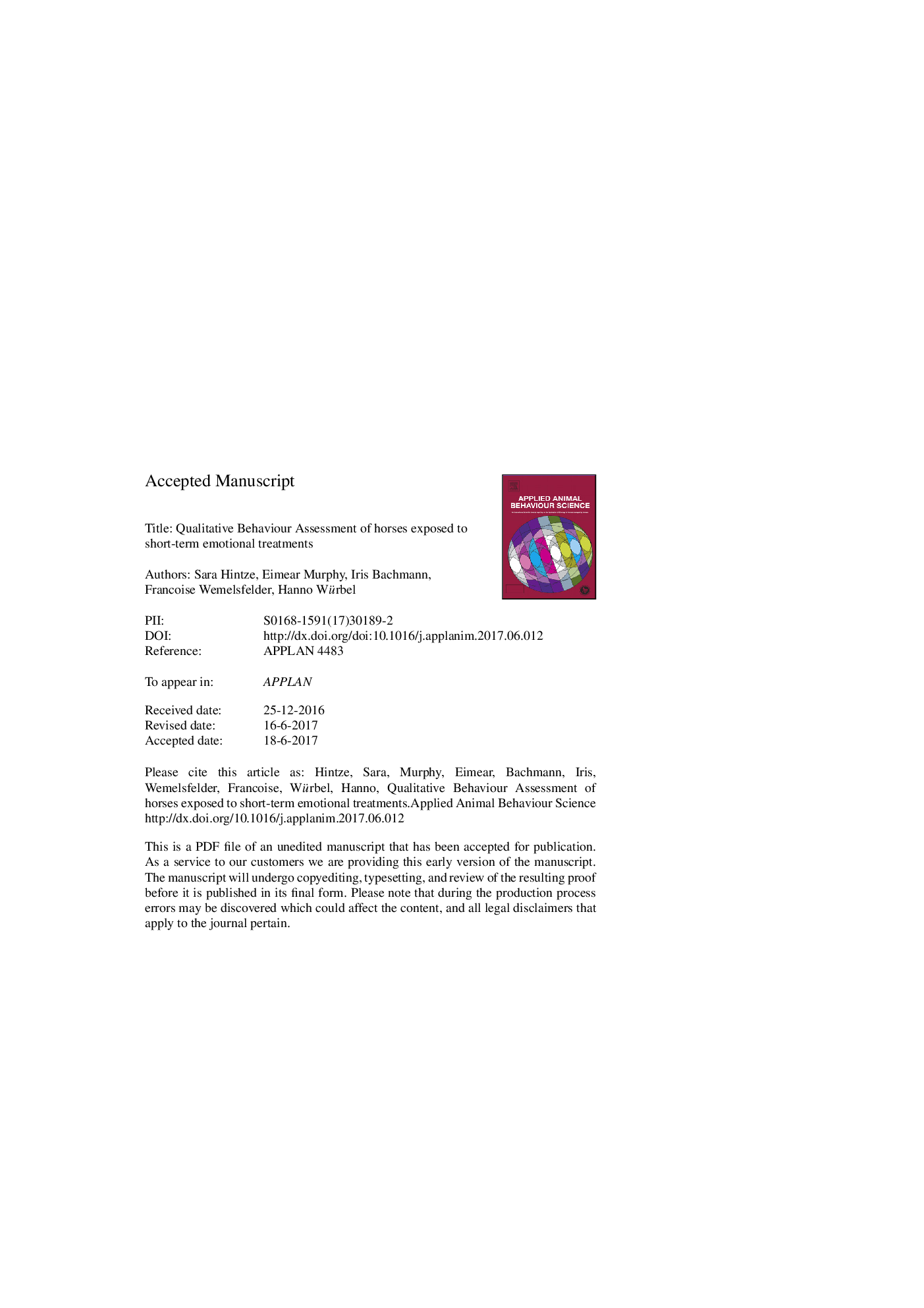| کد مقاله | کد نشریه | سال انتشار | مقاله انگلیسی | نسخه تمام متن |
|---|---|---|---|---|
| 5763225 | 1625310 | 2017 | 32 صفحه PDF | دانلود رایگان |
عنوان انگلیسی مقاله ISI
Qualitative Behaviour Assessment of horses exposed to short-term emotional treatments
ترجمه فارسی عنوان
ارزیابی کیفی اسب در معرض تداخل عاطفی کوتاه مدت
دانلود مقاله + سفارش ترجمه
دانلود مقاله ISI انگلیسی
رایگان برای ایرانیان
کلمات کلیدی
حالت عاطفی، ارزیابی رفتار کیفی، رایگان انتخاب پروفایل بیان رفتاری، اسب، رفاه حیوانات،
موضوعات مرتبط
علوم زیستی و بیوفناوری
علوم کشاورزی و بیولوژیک
علوم دامی و جانورشناسی
چکیده انگلیسی
Assessing emotion in animals is fundamental to the study of animal welfare with methodologies for reliable and valid assessments being highly desirable. Qualitative Behaviour Assessment (QBA) is based on the assumption that human observers are capable of integrating details of animals' behavioural expressions using descriptors (e.g. calm, playful) that reflect the animals' putative emotional experiences. Our study aimed at assessing how treatments assumed to induce different short-term emotional states of both positive and negative valence would affect the observers' judgements of horses' behavioural expressions. To this end, 16 horses were each exposed to two positive (grooming, food anticipation) and two negative treatments (food competition, waving a plastic bag) while being video-recorded. Using a Free Choice Profiling methodology, fifteen observers who were blind to treatment were asked to describe and score the horses' behavioural expressions based on 45 s long video clips. General Procrustes Analysis revealed consensus between the observers' judgements. Three main dimensions of behavioural expression were identified, explaining 84.7% of the variation between horses. Dimension 1 (D1) was positively associated with the terms 'calm/relaxed/content' and negatively with the terms 'nervous/stressed', whereas dimension 2 (D2) was described as ranging from 'irritated/impatient/angry' to 'frightened/insecure', and dimension 3 (D3) was labelled as ranging from 'curious/interested' to 'aggressive/irritated'. Linear mixed-effect models revealed an effect of treatment on the horse scores on all three dimensions (D1: F4,60 = 86.90, p < 0.0001; D2: F4,60 = 69.57, p < 0.0001, D3: F4,60 = 11.05, p < 0.0001). In line with our hypotheses, horses were judged as 'calm/relaxed/content' (D1) during grooming, whereas they were assessed as 'stressed/nervous' (D1) and 'insecure/frightened' (D2) when exposed to the plastic bag. In the two food treatments (food anticipation, food competition), horses were judged as 'irritated/impatient/angry' (D2). However, on dimension D3, horses during food anticipation were also assessed as more 'curious/interested' than in any other treatment. Our study demonstrates that observers showed consensus in their assessment of horses that were exposed to positive and negative short-term treatments and that they could differentiate between these treatments consistent with our hypotheses. Our results indicate that QBA is a promising tool to complement animal welfare assessments in situations of multiple emotional dimensions of both positive and negative valence.
ناشر
Database: Elsevier - ScienceDirect (ساینس دایرکت)
Journal: Applied Animal Behaviour Science - Volume 196, November 2017, Pages 44-51
Journal: Applied Animal Behaviour Science - Volume 196, November 2017, Pages 44-51
نویسندگان
Sara Hintze, Eimear Murphy, Iris Bachmann, Francoise Wemelsfelder, Hanno Würbel,
